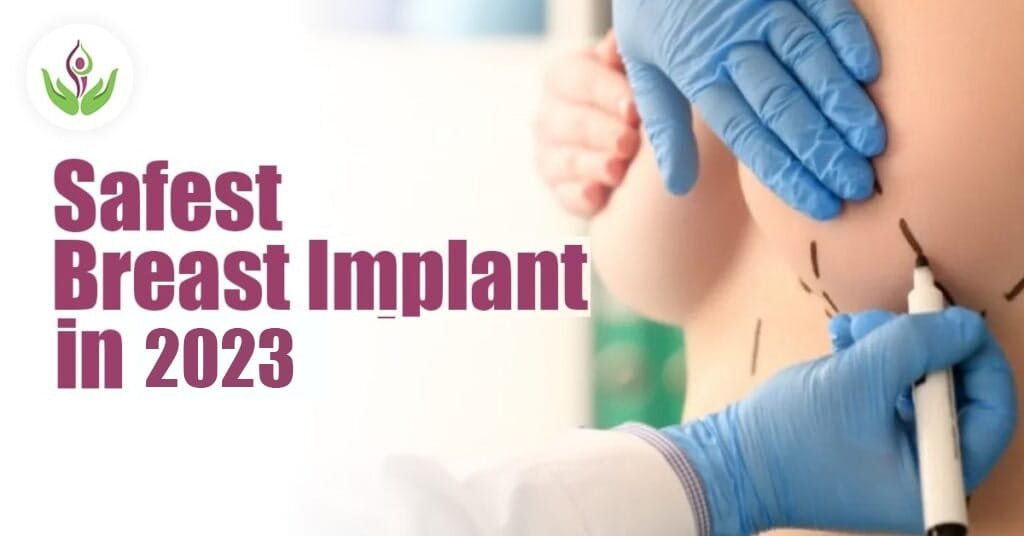Overview
Do You Think It Will Be Safer To Get Breast Implants In 2023? The most common question I have heard from many patients regarding breast implants in recent times is – Are breast implants safe now in 2023?
This question has been raised due to recent news coverage that published the connection between breast implants and rare adverse outcomes including autoimmune disorders and cancer. So, I thought I will lift the lid over the safety of breast augmentation out of the controversial story that has stormed the world for almost a decade and this issue is still not resolved.
Case Study
Millions of females have breast implants and around 400,000 females in the U.S. opt for breast implants every year, as per the American Society of Plastic Surgeons. Among them, 300,000 go for cosmetic surgeries while 100,000 go for reconstructive surgeries. Saline or silicone-type breast implants are used in all these surgeries.
In spite of their extensive popularity, the safety of these implants has been at the center of rising public turmoil since the 1980s due to their connection with an increased risk of systemic diseases. However, this controversy was subdued by a 1999 research study published by an Institute of Medicine. This study concluded that there was no substantial evidence to support a direct association between the use of breast implants and systemic diseases.
In the US, FDA Breast Implant Post Approval Studies: Long-term Outcomes in 99,993 Patients published in the Annals of Surgery [1], Anderson M.D. The research team observed the outcomes of prospectively collected data on nearly 100,000 females who underwent saline or silicone implant-based breast reconstruction (13%) and cosmetic breast enhancement treatment (87%) between 2007-2009. 83 percent of patients received silicone implants as they are comparatively lighter and more natural. The outcomes of every patient were assessed during 3-4 post-operative visits and yearly follow-ups.
The rate of systemic harm was compared between patients with silicone implants and the general population. Patients with saline implants were excluded from reporting. Finally, patients with silicone breast implant repertoire systemic diseases such as Sjogren’s syndrome, rheumatoid arthritis, scleroderma, dermatomyositis, melanoma, multiple sclerosis, myositis, and neurological disorders twice the general population. Lesser than 3% had implant rupture.
Short Summary
Only one case of breast implant-associated anaplastic large cell lymphoma (BIA-ALCL) was also reported by the patient associated with textured implants. Its incidence varies from 1 in 3,800 to 1 in 30,000 females with textured implants. To date, around 457 females have been diagnosed with BIA-ALCL malignancy, which prompted the FDA to issue a warning letter to physicians on February 6, 2019, to look out for this rare disease.
History
In 1992, the FDA restricted the use of silicone gel breast implants to females having reconstruction after their surgical procedure for breast cancer. Females had to select saline breast implants for their breast augmentation.
Later in the year 2006, when no research studies or surveys established a direct connection between silicone implants and immunological diseases, the FDA looked into this issue, and the FDA approved the sale of several silicone implants.
Mark W. Clemens, M.D., associate professor, Plastic Surgery and Senior Investigator, said
This study did not report a direct link or causative effect between implants and these diseases. It is important to understand the limitation of the study was that some diseases were reported by patients and not necessarily diagnosed by a physician.
In October 2019, the FDA released the proposed language for labeling the new breast implants, including a black box warning upon the implants. A patient decision checklist should also be attached as well to ensure that the females opting for implants are well-informed about the risks. Binita Ashar, MD, director of the FDA’s Office of Surgical and Infection Control Devices, said
This admonition is the most noticeable thing we can do to focus on the issue. We need patients to realize that we accept their reports of manifestations. Also, we’re attempting to find out more so we can all the more likely anticipate which patients may encounter issues and who may have to stay away from breast implants.
Short Summary
The surgeons must educate their patients completely by discussing these systemic harms. Females must be well aware of these potential risks before weighing the pros and cons of saline VS silicone implants.
Safest Types of Breast Implants in India
In order to increase the breast size or to replace breast tissues that have been removed due to cancer or trauma or due to any abnormality breast implant surgery is done.
There are generally two types of Breast Implants – Saline and Silicone. Both are safer for breast augmentation and breast reconstruction. FDA has issued stronger guidelines before a patient gets breast augmentation.
FDA has issued these must things prior to having breast implantation in order to ensure safety:
- Checklist of the patient’s decision
- Silicone gel-filled breast implants rupture screening recommendations
- A device description that includes materials used in the devices
- Patient device ID cards
These requirements are said to have a safer breast implant on behalf of both physicians and patient organizations.
Thus if these requirements are kept in mind breast implants will be safer. FDA has strongly recommended the sales of breast implants to providers and to the health facilities that review the potential risks of the device with the patients prior to the surgery.
Before taking the final decision you must first consult with the doctor about all the risks and changes associated with it.
How should you help your patients to reduce the risk of systemic harm with breast implants?
After discussing the risks of breast implants, you should consider the following:
- Select a saline-based breast implant instead of a silicone implant
- Even if the patient prefers silicone implants due to their better natural look, choose a smooth surface over the textured one.
- It is better to reconsider implant augmentation if the patient has a family history of connective tissue or autoimmune disorders, despite getting negative results by performing formal tests.
- Patients should continue to have yearly breast MRI tests along with mammography to assess any new symptoms in the implanted breast. By educating the patients, they can easily identify the symptoms well in advance and undergo timely treatment.
- Remember that breast implants won’t prevent the breasts from sagging. The patient should go for a breast lift along with breast augmentation.
- Some females can successfully breastfeed while others cannot.
- Since there might be a chance of implant rupture, weight gain, or weight loss, there is a chance of removing the breast implant. Hence, they are not guaranteed to last a lifetime. However, in modern semi-solid silicone implants, leaks can be easily treated and replaced in an outpatient setting.
- For augmentation, females who are 18 and more can have saline implants while females who are 22 and more can only opt for silicone implants.
- Saline implants don’t have platinum, unlike silicone implants. Though people think that platinum can be injurious, the FDA says that there is no study that reports that platinum poses any risk in silicone implants.
- The size of saline implants can be increased or decreased non-surgically even after undergoing augmentation. However, it’s not possible in the case of silicone implants since the silicone gel size is profiled and standardized.
Final Takeaway
The FDA has considered both silicone and saline breast implants safe and effective. Research on their safety and efficacy is ongoing. However, any surgery as well as implantable devices have potential side effects. As cosmetic surgeons, it is our responsibility to regularly monitor the safety of breast augmentation.
All physicians and patients should be well aware of all the possible complications associated with breast implants. Be armed with the right information so that you can take the right possible decision on reconstruction and augmentation. Similarly, females with breast implants should monitor themselves and report unusual symptoms if any.
Remember that breast implants can be a positive thing in the right patient with the proper care team. Yet, they are not free of risk.
Short Summary
FDA ensures enough safety for breast implants by asking the manufacturers to post the labeling of the updated device on their website within 30 days. If the product is great there will be no issues.
What are the long-term effects of breast implants?
A breast implant might cause a rupture as time increases. Over time breast implants are likely to rupture as it ages. But there is no definite answer to how long it will sustain. FDA states that the breast implant sustains for a duration of around ten years as per the manufacturer’s warranty.
The breasts are also subjected to a change in shape and not only rupture issue is seen to have been observed, one breast might look different from another one.
Breast implants might also cause a loss of sensation in the breast and nipple as well as pain. Sometimes they might also cause excessive scarring and wrinkling.
They might also cause irreversibility in the tissues of the breasts if you get the implants removed. Your breasts might also get wrinkled or dimmed.
You should be mentally prepared to have additional surgeries in order to maintain the shape of your breast. The risk of complications might be higher.
Short Summary
In terms of long-term effects if the surgery is done under experts and precautions have been followed the surgery is said to be successful even for years. There are rare cases that a breast implant might cause health issues.
Can breast implants cause health problems?
Some of the health issues that are said to have been found are fatigue, muscle weakness, and muscle and joint pain. Twenty percent of patients had to undergo additional surgeries just after three years due to certain complications. The complications that are reported include infection, loss of the sensation of nipples and breasts, hematoma, scarring, wrinkling, and pain. Change in the shape of the breasts can also happen.
Several autoimmune illnesses have been recorded in women who have implants, including lupus, scleroderma, and rheumatoid arthritis. Toxins in silicone gel, according to researchers, may induce the development of autoimmune illnesses in women who are predisposed to them.
Short-term studies indicate that implants do not cause autoimmune disorders, but there is a need for long-term research that covers a broader, more diverse population of women because autoimmune diseases can take years to emerge.
Short Summary
These health issues are seen in rare cases and only among 1 percent of the breast implant population. You might need additional surgeries or nonsurgical treatments to cure these health issues.
Do breast implants shorten your life?
If the surgery goes with no complications or any other infection it will not alter the expectancy of your life. Breast implants are not reported to have a shorter life span. In the past, some women have been reported to have cancer due to the infection that is caused by breast implants.
There are chances that health issues might arise like muscle pain and joint pain, rupture, weakness, etc. There might also be scarring in tissues or a change in the shape of the breasts.
Breast augmentation does not expire, but they are not guaranteed to last a lifetime. Saline or Silicone breast implants might last anywhere from 10 to 20 years on average. Many are, however, removed earlier because of problems or cosmetic issues. However, research is going on to enhance the duration of the implants.
Short Summary
It is a myth that breast implants shorten your life. Having given proper care and taking precautions will lead to a healthy breast implant. There is no such evidence that it has led to a shorter life period.
What happens if you never replace breast implants?
There are cases where breast implants are reported to have been sustained for around 20 years. Some ladies are completely delighted with their original implants and will keep them for the rest of their lives. However, failing to replace implants when medically suggested might have serious repercussions.
A silicone rupture, for example, can make your breasts feel tight or painful. This is an issue that should be acknowledged. Breast augmentation with implants extends the overlaying breast skin envelope, resulting in an increase in the amount of breast skin.
As a result, those interested in breast implant removal without replacement may notice that their breasts do not look the same as they did prior to breast augmentation. The age of the woman, the size of the implants, and the amount of time the implants have been present can all create alterations that may not be visible until the implants have been removed.
Short Summary
According to the manufacturing companies, it is reported that the warranty period of the silicone material used in breast implants is around 10 or 20 years. Though it is not recommended to get them replaced after every 10 or 20 years you must consult your doctor if any complications arise.
What is the healthiest breast implant?
Breast implants that have been approved by the FDA are all safe. The type of breast implant you pick should not be based on what is thought to be the safest option. It is better to choose a breast implant that seems to be the best fit for your goals and your body type. There have been many cases where breast implants have not been found to be replaced after a certain duration.
Dr. Fan has worked as a consultant and scientific investigator for Allergan and Sientra, two of the three breast implant manufacturing companies that produce implants used in the United States today, and he feels that patients should have confidence in the safety of the implants they pick.
Regular silicone breast implants are the most common option for a variety of reasons, including:
- Excellent track record in terms of safety and performance.
- On the contrary to saline implants, they feel more authentic, real, and natural.
- On comparing it to the saline implants, it is less likely to be visible under the skin (generate ripples).
Conclusion
Contrary to popular belief, breast implants are not linked to the development of autoimmune diseases, breast cancer, or other disorders. The most important thing, maybe, is to set realistic expectations. Find a doctor with whom you can speak honestly and openly. Make certain that you are aware of the hazards associated with breast implants. Make certain that you comprehend both the best and worst-case scenarios. The more information you have, the more assured you will be in your decision.














